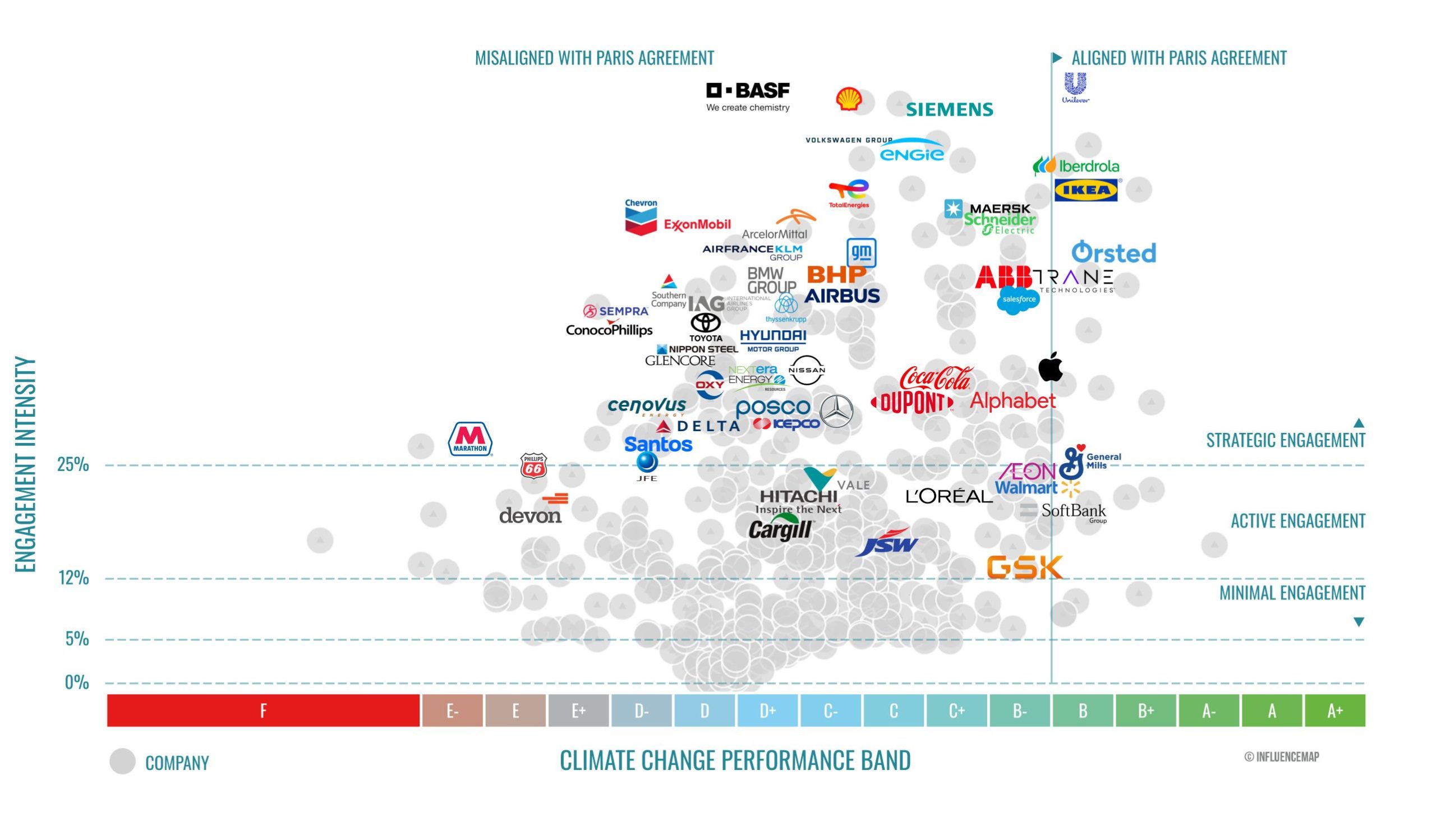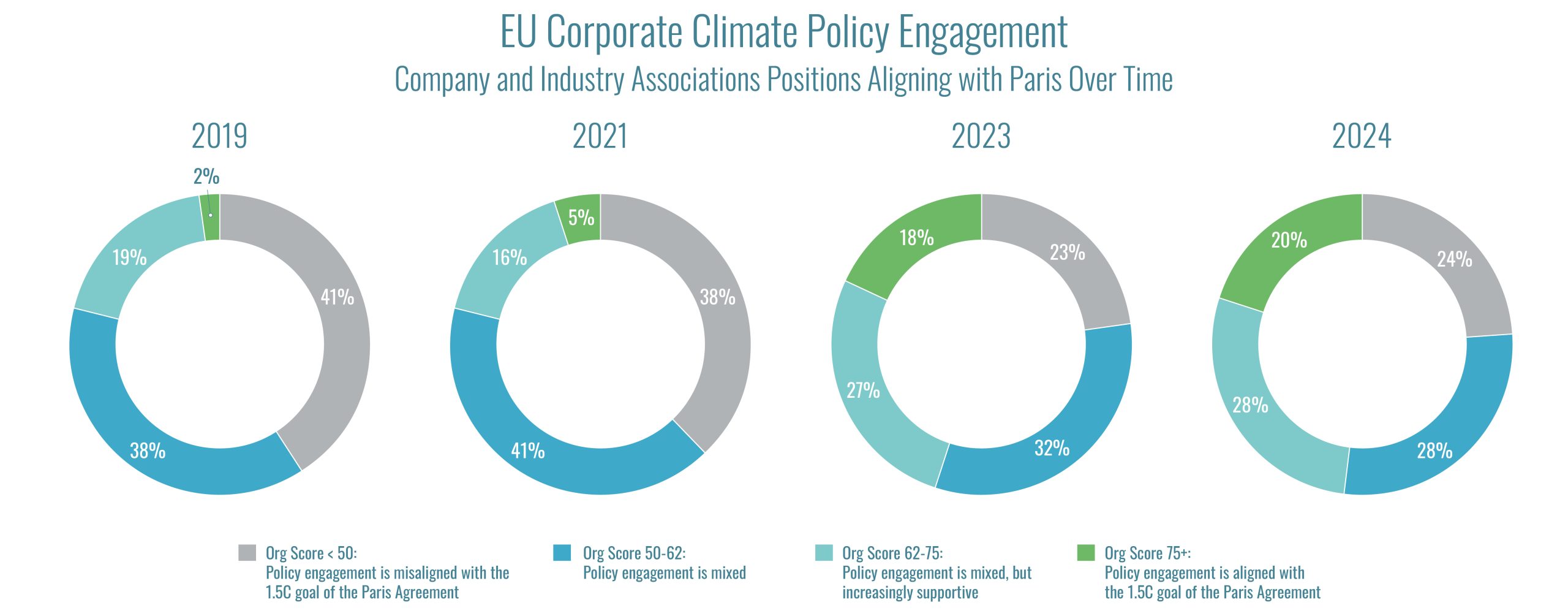
As institutional investors, we recognise that lobbying that seeks to delay, dilute, or block climate action runs counter to our interests, and those of our clients and beneficiaries. Equally, we believe that proactive, positive corporate lobbying has the potential to help deliver the type of policy needed to unlock rapid decarbonisation.
There is ample evidence that corporate lobbying – carried out directly and indirectly, through trade associations and similar organisations – frequently opposes policy measures that would support the goal of delivering net-zero emissions by 2050, as illustrated here.

The European Climate Lobbying Working Group (CLWG) is a ‘thematic workstream’ of Climate Action 100+ that aims to drive Paris-aligned corporate climate lobbying. Current members are AkademikerPension, AP7, BNP Paribas Asset Management , the Church of England Pensions Board and Railpen. Supported by IIGCC, the group’s members work with company co-leads to deepen engagement and accelerate action with selected European companies.
The CLWG’s work is underpinned by the 2018 Investor Expectations on Corporate Lobbying on Climate Change and the Global Standard on Responsible Corporate Climate Lobbying. The Standard is integrated into the Net Zero Company Benchmark (NZCB): TPI assesses companies’ lobbying disclosure (Indicator 7) and InfluenceMap assesses the alignment of companies’ policy engagement with the Paris Agreement and the completeness of their disclosure. (See Annex).
Last Autumn, using InfluenceMap data, the CLWG identified twelve European CA100+ companies that are the poorest performers on these measures. Eleven had not published a climate lobbying review and one, the largest in its sector, had published a poor review. The CLWG contacted the engagement leads for those companies to discuss whether and how to intensify pre-existing engagement with the management and /or escalate engagement with each of them, by, for example, writing to the Board or proposing a shareholder resolution. We also continued to support engagement with other companies where lobbying was a priority for lead investors.
Over the last nine months our work has yielded many welcome developments from several companies:
- Unilever published its first Climate Policy Engagement Review for 2023 which was comprehensive and met all assessment criteria. As a result, it received a score of 100% from InfluenceMap.
- Danone also made many more disclosures in early 2024; it received a score of 50% from InfluenceMap. (See case study).
- National Grid also published a review for the first time, following many years of engagement including escalation measures led by members of the CLWG. The review scored 21%.
- Naturgy and TotalEnergies have also published reviews which are yet to be assessed by InfluenceMap.
Four others committed to publish a review by early 2025. One company has not responded to our letter, and discussions are still in progress with the three remaining companies.
Across the whole European corporate landscape, progress is being made, but it needs to accelerate.

The CLWG will continue to work with CA100+ leads to press for further improvement in European companies’ lobbying and related disclosures and aim to forge links with and support the work of similar working groups in other regions to make corporate climate lobbying a force for good.
Useful links
Methodologies | Climate Action 100+
2023-InfluenceMap-Methodology.pdf (climateaction100.org)
InfluenceMap CA100 Disclosure Scorecards
Annex
NZCB
Indicator 7: Climate Policy Disclosure assessed by TPI
7.1 The company has a Paris Agreement-aligned climate lobbying position and all of its direct lobbying activities are aligned with this.
A) The company has a specific commitment/position statement to conduct all of its lobbying in line with the goals of the Paris Agreement.
B) The company lists its climate-related lobbying activities, e.g. meetings, policy submissions, etc.
7.2 The company has Paris Agreement-aligned lobbying expectations for its trade associations, and it discloses its trade association memberships.
A) The company has a specific commitment to ensure that the trade associations the company is a member of lobby in line with the goals of the Paris Agreement.
B) The company discloses its trade associations memberships.
7.3 The company has a process to ensure its trade associations lobby in accordance with the Paris Agreement
A) The company conducts and publishes a review of its trade associations’ climate positions/alignment with the Paris Agreement
B) The company explains what actions it took as a result of this review.
Climate Policy Engagement Alignment assessed by InfluenceMap
- Real-World Climate Policy Engagement: An assessment of the extent to which a company’s real-world climate policy engagement (direct and indirect via industry associations) is aligned with the goals of the Paris Agreement.
- Accuracy of Climate Policy Engagement Disclosures: An assessment of the accuracy of a company’s reporting on its direct and indirect (via industry associations) climate policy engagement activities.
- Robustness of Corporate Climate Policy Engagement Review & Misalignment Management Processes: An assessment of the quality and robustness of a company’s process to identify, report on, and address specific cases of misalignment between its climate policy engagement activities and delivering the 1.5°C goal of the Paris Agreement.